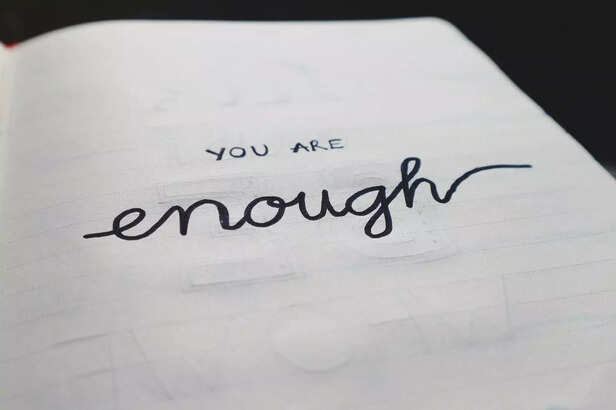You’re Not Insecure. You’re Just Surrounded by Comparison - Gita on True Inner Value
Riya Kumari | Jun 24, 2025, 17:59 IST
If you've ever opened Instagram, spotted a girl with flawless skin, a six-pack, and a Himalayan retreat booked for next Tuesday, and felt a strange mix of admiration and inexplicable self-loathing... congratulations. You're not broken. You're just living in 2025. Let’s just start with the obvious: You're just being emotionally assaulted 24/7 by perfectly curated lives, half-truths, filtered faces, “candid” laughter that took six takes, and that one friend who “doesn’t care about social media” but somehow always looks effortlessly radiant while rescuing baby goats in Bali.
We don’t talk about it much, but almost everyone carries this quiet ache: "Why am I not more?" More successful. More beautiful. More disciplined. More confident. More... something. And it’s strange because this ache doesn’t come from within. It’s shaped by everything outside of us. The Gita calls this out without flinching. The problem isn’t that you lack worth. The problem is that you keep looking for it in places that were never meant to give it.
You Were Whole Before the World Made You Doubt It

When you were a child, you didn’t compare your laugh to someone else’s. You didn’t wonder if your joy was valid. You didn’t measure your days by how productive they looked to others. You just were. Then came the world. It told you to shine—but only in a way that fit the mold. It told you to stand out—but not too much. It told you to love yourself—while feeding you reasons not to. And slowly, without noticing, you began to believe that peace, joy, worth... were things to earn, not things you already had.
The Gita reminds us:
“One who is not disturbed by external circumstances and remains steady in pleasure and pain is truly wise.”
It doesn’t say “be unaffected” because you’re numb. It says: Be anchored. So that when the waves come—and they will—you don’t forget who you are.
Comparison Is a Thief That Disguises Itself as Motivation

We often mistake comparison for ambition.
“If she can do it, I should be able to.”
“If he’s there already, I must be behind.”
“If I’m not constantly improving, I’m falling.”
But here’s the truth the Gita offers gently but firmly: Growth isn’t meant to be measured against someone else’s timeline. Arjuna, in the Gita, is about to step into a battle—one that will define everything. But he pauses. Not because he doubts his strength, but because he’s overwhelmed by the consequences, the noise, the pressure. And Krishna tells him:
“Do your duty, but don’t tie yourself to the outcome. You are only responsible for your action—not for how it is received, compared, or judged.”
Imagine the freedom in that. To show up fully, do your work deeply, and not let your peace be held hostage by how it performs in the world’s eyes. We live in a world where everyone’s shouting their success into the void. We confuse volume with value. You’ve just been standing too close to people who profit off making you feel otherwise.
You Are Not Falling Behind. You’re Just Hearing Too Many Voices

The modern world is loud. Everyone has a strategy. Everyone has a life update. Everyone is “hustling,” “healing,” or “thriving” — sometimes all at once, and sometimes only online. It’s easy to look at yourself and think: Am I doing enough? Am I being enough? But the Gita doesn’t speak in hashtags or hustle culture. It speaks in silence. Just—remember who you are when you stop performing. No ‘10 steps to confidence.’ No filters. No productivity hacks. It says:
“You already are enough. Now act from that knowing—not to prove it.”
We don’t need to keep reinventing ourselves to feel worthy. We need to remember ourselves. It’s not about not having desires. It’s about what happens when those desires come from seeing what others have—and deciding it must mean you’re lacking.
You didn’t want a bigger life until you saw someone else’s.
You didn’t doubt your path until theirs looked shinier.
You weren’t insecure—you were just surrounded.
Wisdom Isn’t Loud. It’s Still

We often think wisdom is complicated. But real wisdom isn’t made of big words or abstract ideas. It’s made of truth you already knew deep down but forgot in the noise. The Gita isn’t just a spiritual text. It’s a conversation—a reminder. That when the world keeps pulling you outward, your peace lives in the opposite direction. That your value isn’t negotiable. That you don’t need to compete to belong. And that healing begins not when you fix yourself, but when you stop believing you’re broken in the first place.
You think you’re insecure, but what you really are is disconnected—from yourself, from your real values, from any stillness. You’re measuring your worth by applause you don’t even want. You’re building a life based on lives that aren’t real. Confidence today is aesthetic. A vibe. A script. People perform healing. They perform growth. They say “protecting my peace” while obsessively checking likes. Even “self-love” feels like a sales pitch. You used to know who you were—until you started watching other people be shinier versions of themselves. Now you’re wondering if you should’ve been a YouTuber, or married rich, or switched careers three years ago.
So What Now?
Stop asking: What do they think of me? Start asking: What do I know of myself? Comparison will always exist. But peace is found in choosing what you listen to. You are not falling behind. You are not average. You are not invisible. You are just learning to unlearn a world that profits from your doubt. And you’re not late. You’re right on time to remember who you were before the noise began.
You Were Whole Before the World Made You Doubt It

Enough
( Image credit : Pexels )
When you were a child, you didn’t compare your laugh to someone else’s. You didn’t wonder if your joy was valid. You didn’t measure your days by how productive they looked to others. You just were. Then came the world. It told you to shine—but only in a way that fit the mold. It told you to stand out—but not too much. It told you to love yourself—while feeding you reasons not to. And slowly, without noticing, you began to believe that peace, joy, worth... were things to earn, not things you already had.
The Gita reminds us:
“One who is not disturbed by external circumstances and remains steady in pleasure and pain is truly wise.”
It doesn’t say “be unaffected” because you’re numb. It says: Be anchored. So that when the waves come—and they will—you don’t forget who you are.
Comparison Is a Thief That Disguises Itself as Motivation

Race
( Image credit : Pexels )
We often mistake comparison for ambition.
“If she can do it, I should be able to.”
“If he’s there already, I must be behind.”
“If I’m not constantly improving, I’m falling.”
But here’s the truth the Gita offers gently but firmly: Growth isn’t meant to be measured against someone else’s timeline. Arjuna, in the Gita, is about to step into a battle—one that will define everything. But he pauses. Not because he doubts his strength, but because he’s overwhelmed by the consequences, the noise, the pressure. And Krishna tells him:
“Do your duty, but don’t tie yourself to the outcome. You are only responsible for your action—not for how it is received, compared, or judged.”
Imagine the freedom in that. To show up fully, do your work deeply, and not let your peace be held hostage by how it performs in the world’s eyes. We live in a world where everyone’s shouting their success into the void. We confuse volume with value. You’ve just been standing too close to people who profit off making you feel otherwise.
You Are Not Falling Behind. You’re Just Hearing Too Many Voices

Mask
( Image credit : Pexels )
The modern world is loud. Everyone has a strategy. Everyone has a life update. Everyone is “hustling,” “healing,” or “thriving” — sometimes all at once, and sometimes only online. It’s easy to look at yourself and think: Am I doing enough? Am I being enough? But the Gita doesn’t speak in hashtags or hustle culture. It speaks in silence. Just—remember who you are when you stop performing. No ‘10 steps to confidence.’ No filters. No productivity hacks. It says:
“You already are enough. Now act from that knowing—not to prove it.”
We don’t need to keep reinventing ourselves to feel worthy. We need to remember ourselves. It’s not about not having desires. It’s about what happens when those desires come from seeing what others have—and deciding it must mean you’re lacking.
You didn’t want a bigger life until you saw someone else’s.
You didn’t doubt your path until theirs looked shinier.
You weren’t insecure—you were just surrounded.
Wisdom Isn’t Loud. It’s Still

Court
( Image credit : Pexels )
We often think wisdom is complicated. But real wisdom isn’t made of big words or abstract ideas. It’s made of truth you already knew deep down but forgot in the noise. The Gita isn’t just a spiritual text. It’s a conversation—a reminder. That when the world keeps pulling you outward, your peace lives in the opposite direction. That your value isn’t negotiable. That you don’t need to compete to belong. And that healing begins not when you fix yourself, but when you stop believing you’re broken in the first place.
You think you’re insecure, but what you really are is disconnected—from yourself, from your real values, from any stillness. You’re measuring your worth by applause you don’t even want. You’re building a life based on lives that aren’t real. Confidence today is aesthetic. A vibe. A script. People perform healing. They perform growth. They say “protecting my peace” while obsessively checking likes. Even “self-love” feels like a sales pitch. You used to know who you were—until you started watching other people be shinier versions of themselves. Now you’re wondering if you should’ve been a YouTuber, or married rich, or switched careers three years ago.
